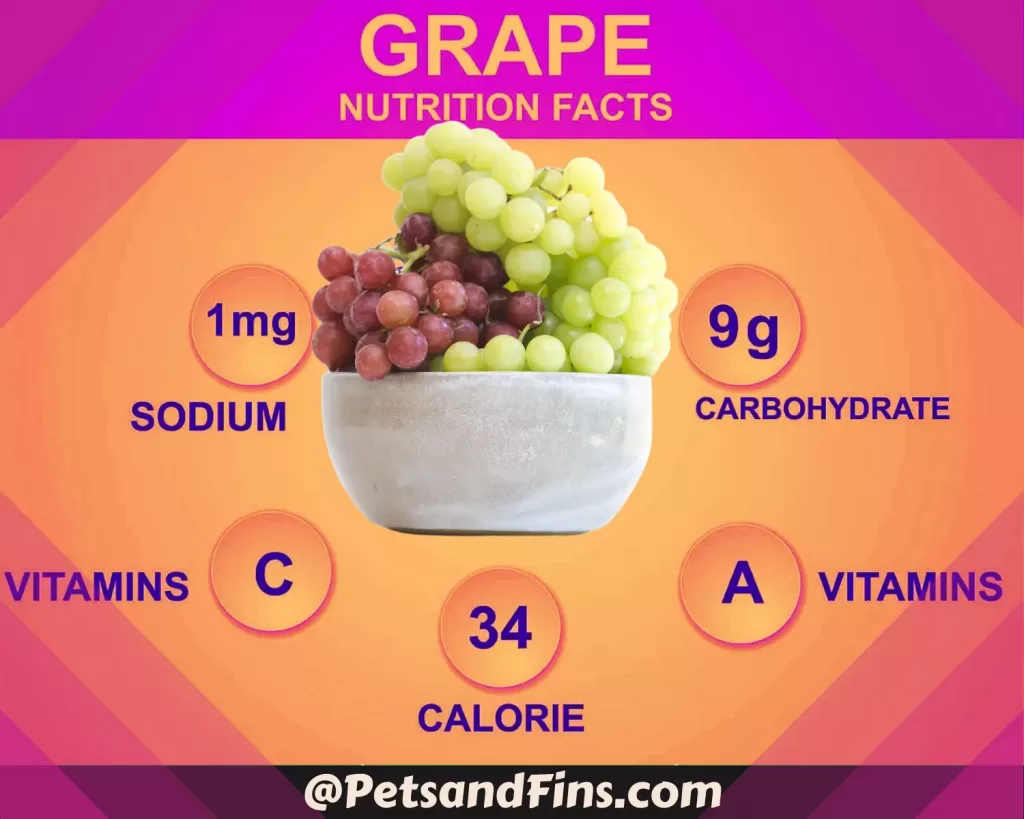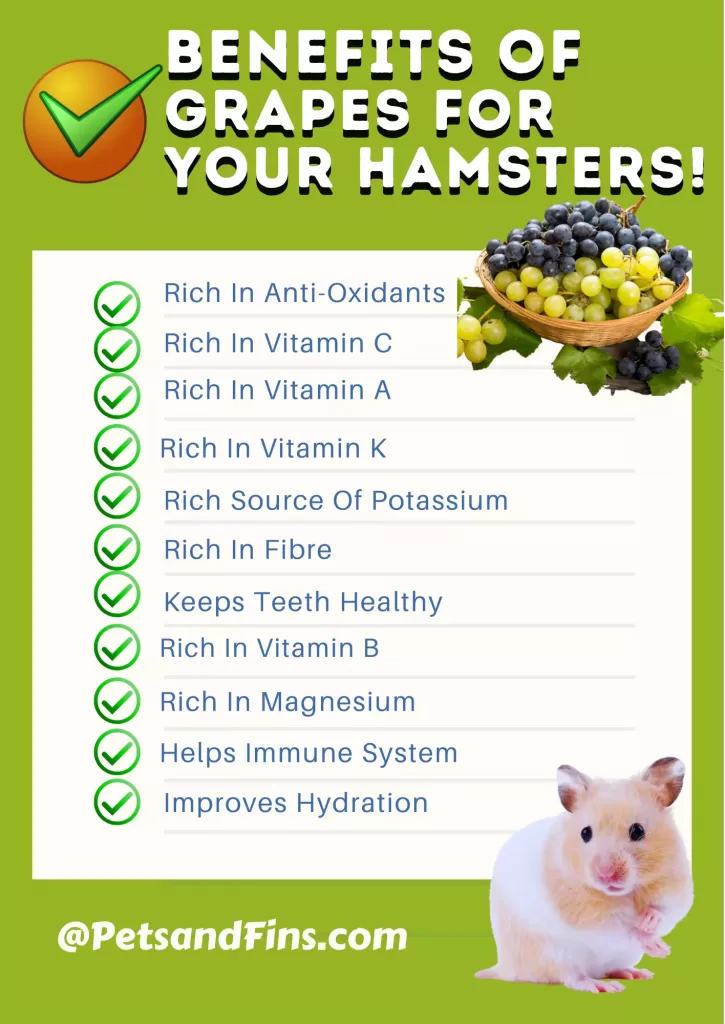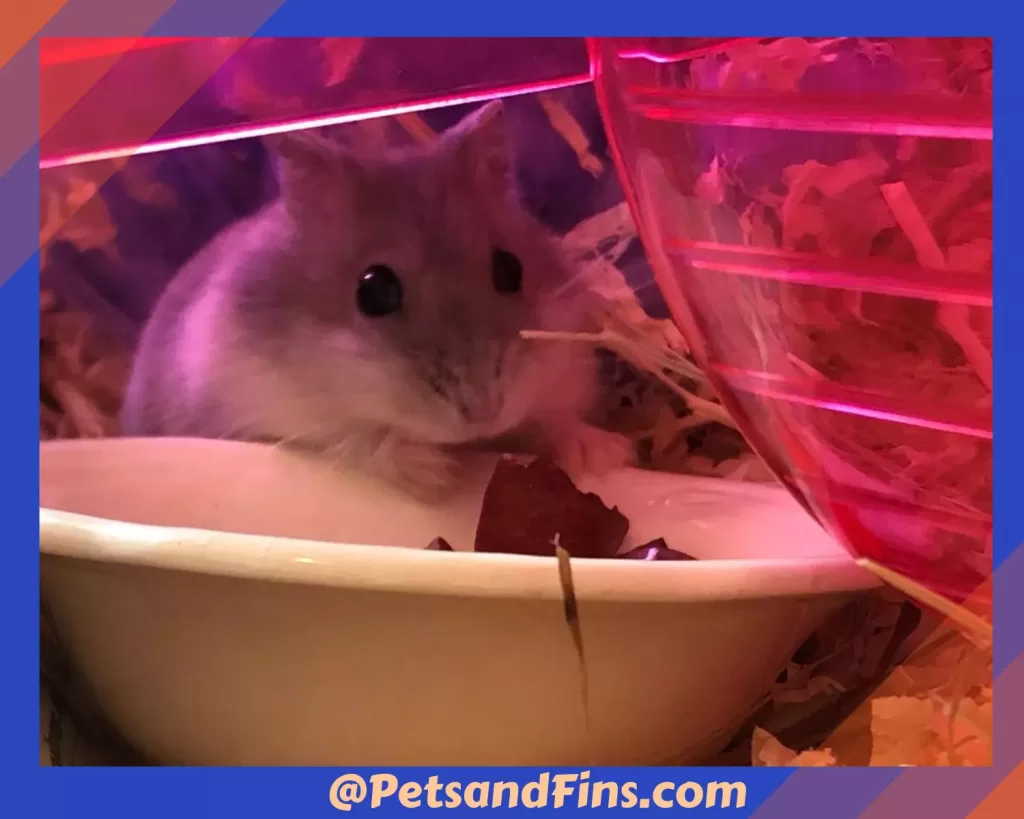I am sure you have seen videos of hamsters eating grapes. I can’t promise that they are all true, but the idea is still intriguing. Can hamsters eat grapes? Can they be beneficial for them like most fruits? Can they cause any side-effects? How to introduce grapes to hamsters and what type of grape should you buy for your pet? This article will answer these questions and more!
Grapes are a delicious fruit, full of nutrients and vitamins. But can hamsters eat grapes? If your hamster has no food restrictions but just wants some extra variety in their diet, there is no harm in giving them a few every now and again, but please note that too many could lead to diarrhea due to how rich they are!
Can Hamsters Eat Grapes?
Yes, but in moderation! Grapes are a tasty fruit that you can give to your pet hamsters on occasion, as long as it isn’t their only source of food. However, please remember that excessive consumption may lead to diarrhea, so do not overfeed them this kind of treat.
Although the answer is yes, it also depends on which type of hamster you have. Syrians can eat grapes in larger quantities than Robos and Dwarfs because they’re more capable of tolerating sugar levels. Dwarfs, on the other hand, need a smaller amount because of how small they are; if too much is eaten, it could lead to digestion problems such as diarrhea or constipation.

You may want to avoid giving them raisins though – not only is it that we should generally prefer fresh fruit over dried up versions of food items, but these sugary treats might cause serious stomach issues when ingested by your pet hamster.
If you would like to feed your hamster grapes, only do it occasionally and in very small amounts. If you give too many grapes at once or add them to a large portion of their diet, then this will lead to diarrhea, which can last up to several days while the body gets used to having so much fruit all of a sudden!
This is why I recommend introducing grapes gradually into the hamsters’ diet if possible, and stopping immediately if there are any signs that it doesn’t agree with them, such as diarrhoea.
Your hamster should receive most of their nutrients from the daily pellets they are fed. If you want to give them a treat, grapes can be used once in awhile, but shouldn’t form an integral part of your pet’s diet.
It is important to remember that fruit should only ever make up a small part of your furry friend’s daily intake. However, if you do give them some grapes on occasion, then this will help with providing variety and preventing boredom! The main benefit of giving these fruits as treats is more psychological than anything else.
Benefits Of Grapes For Hamsters
Grapes actually have some health benefits for hamsters, so they can be a fun treat to give them on occasion if you really want too.Grapes are full of nutrients and vitamins. They are a delicious and healthy snack for your hamster. In addition to being incredibly tasty , grapes have numerous benefits which make them so popular.

- Rich In Vitamin C – which is important for the immune system (making them great at helping your hamster fight off any infections or diseases!) Vitamin C helps with growth, reduces the risk of diseases and infections, boosts skin elasticity (which might help prevent future injuries) and keeps teeth healthy.
- Rich In Antioxidants – this means they can help cleanse the body and boost overall health. They contain Omega-Fatty Acids which can reduce inflammation in young, old or sick animals. This makes grapes a fantastic food for not only healthy adult hamsters, but those that may be unwell!
- Rich In Potassium : Potassium can help with heart health, kidneys, muscles and prevent cramping. It also regulates blood pressure, so it is a great choice for those pets who may have cardiovascular issues! This makes it an excellent food to give if your furry friend has already been diagnosed with a condition or illness- because not only does it provide essential dietary elements, but it helps support their system too!
- Rich In Vitamin B : Vitamin B is essential for healthy metabolism, growth and general development. They will benefit from the Vitamin B in this fruit- especially when it comes to things like breeding or pregnancy. Vitamin B is important for many aspects of your pet’s health. It helps their immune system, keeps their cells healthy and improves their metabolism (which can make it easier to keep weight under control).
- Rich In Manganese: Manganese is essential for growth, bone health, and energy production. It also helps with the immune system as well as brain development! This means that not only can grapes give your furry friend a fantastic nutritional boost, but it could help them live longer too- which might be very important if you have an elderly pet or one who isn’t doing so well.
- Can Prevent Cancer: Grape seeds contain a particular compound called Resveratrol, which can help prevent cancer . It contains antioxidants that work hard to reduce inflammation, improve cardiovascular health and protect against free radical damage (which means preventing diseases like arthritis).

- Rich In Fibre: Grapes are an excellent source of fibre which can help with digestion and prevent diarrhea. Fibre helps to bulk up any food your furry friend eats so that it moves through their system more quickly.
Grapes are a good source of fibre, mainly in the form of pectin, which helps to move food through your hamster’s digestive system. This is especially important for elderly and very young animals with slower metabolisms, because it means they can eat less but still get all the nutrients they need!
- Can Keep Hamsters Hydrated: Whilst the main benefits for the average pet owner may not seem immediately obvious (other than being fun), their high water content is great for keeping our little friends hydrated when it’s hot outside or even during winter if you keep them in a warm room.
As such, grapes may be beneficial when trying to encourage pregnant females or those that have just had babies (babies under two weeks) to drink plenty of water too, as this will help keep them hydrated while also giving them something nutritious at the same time .
They can also make an excellent treat or pick-me-up alongside pellets or vegetables on occasion too!
- Healthy Teeth: Grapes are also really good for dentistry as they help to keep the teeth healthy and strong. Hamsters’ teeth will naturally grow throughout their lives and, unfortunately, there isn’t much we, as owners, can do to stop this from happening other than provide them with the correct diet.
- Helps Improve Eye Health: Dark grapes, in particular, are fantastic for helping to improve eye health. This is where antioxidants come into play again, specifically reservatrol, which can help protect vision and reduce the risk of cataracts or other diseases related to eyesight .
All these benefits mean that if your furry friend has a bit of an obsession with grapes (or you decide they would like them as a healthy treat), then there’s no reason not to give them what they want!
This means it could be great for improving eye health, because if you’ve ever seen an animal suffering from conjunctivitis (inflammation, soreness or red eyes), then you will know how unpleasant this can look and mean your furry friend isn’t eating as well either.

- Boosts The Immune System: Grapes are rich in compounds that can help to boost the immune system and improve your pet’s overall health. This helps to not only fight off any existing infections but also reduces their risk of developing new ones at all .
- Rich In Vitamin A:Vitamin A is absolutely essential for your furry friend’s health because it helps to keep their skin, coat, and organs healthy. It also promotes a strong immune system as well as good night vision!Grapes are good for a healthy coat and they help to keep your furry friend’s skin and fur in tip top condition. This can be especially important if they suffer from allergies or sensitive skin .
Side Effects Of Too Many Grapes For Your Hamsters:
There is no denying that if your furry friend eats an excessive amount of grapes, then they may suffer from certain side effects . They aren’t necessarily toxic or extremely harmful to them, but, as with anything consumed in excess, some problems could occur.
Grapes are fine as a treat every so often and even daily for those pets who have been checked by the vet and deemed healthy enough to do so without any issues or concerns being flagged up. However, there still needs to be caution taken when feeding something new like this regularly, because what might seem harmless could end up doing more damage in the long run.

- Digestive Problems : It is possible for them to suffer from digestive problems because they can cause intestinal blockage if eaten in large enough quantities. This means that there’s a very good chance your furry friend may end up suffering some type of digestive distress which would sometimes need to be treated by a vet .
- Diarhhea: Diarrhea is another common side effect of eating grapes if your furry friend eats too much. – it’s not one to be taken lightly and can be quite serious, so it would need prompt treatment. It is a negative side effect for them because it can make your furry friend very uncomfortable and they may want to go to the toilet more often, or even end up passing blood with their stools.
This means that you should be careful about how many grapes you decide to feed your hamster, especially if they are new to this type of fruit – as whilst it isn’t toxic, there can definitely still be some problems associated with eating too many grapes.
- Develop Diabetes: Like in humans, if your furry friend eats an excessive amount of fruit – including grapes, then it can cause blood sugar levels to rise, which could lead to them developing type two diabetes .
If your hamster already has diabetes, then they should not be given grapes because it can make their condition worse and even lead to them developing more serious problems.
This means that if your hamster is diabetic or you suspect they may have some form of this disease (it’s fairly common in the pet population), then refrain from giving them any type of grape product, otherwise it could create additional issues for them . It would definitely be best to discuss with a vet before feeding something new like this, just so everything can be checked out thoroughly first.
- Weight Gain : There is a chance that feeding grapes regularly to your furry friend could lead them to put on weight because they contain natural sugars. If they are being fed other treats as well, then this might cause problems with obesity .
You will know if your hamster has gained too much weight due to the fact that their belly will become enlarged, or if you notice any additional rolls of fat around their body – so watch out for this before giving grape products regularly in excess to them.
- Get Addicted To Sugar Rush : Although this isn’t a common side effect, it can happen if your furry friend becomes too used to the sugar rush experienced when they eat excessive grapes. It is definitely something that needs to be taken seriously because they will end up getting an addiction and it can cause them health problems in the long run .
This means you should always monitor how much fruit/sweet treats they are being given, especially on a regular basis, – as even though grapes aren’t toxic, there could still potentially be some serious consequences for them later down the line, which no one wants to see their pet suffer from.
How Many Grapes Can My Hamster Eat?
Like I explained in my article before, the amount of grapes your hamster should eat depends on breed and age. Generally speaking, larger breeds such as Syrian hamsters can have slightly more quantity of grapes than smaller ones.
Larger breeds like Syrian hamsters will be able to eat more than smaller ones like dwarf or Roborovski types because they are bigger animals with faster metabolisms.
Recommended Quantity:When you introduce grapes to your hamster, the general thumb rule is that it’s best done gradually and not to give heavier portions of grapes at once. It’s usually okay to start by giving 1/5th of a whole grape and monitor how they react in the following few days before increasing the quantity to a max of one full grape,two times per week.For smaller breeds such as Roborovski or Dwarf Hamsters, one half-grape two times per week may be suitable (though this varies depending on weight).
Guidelines For Feeding Grapes To Your Hamster:
If you follow the guidelines below, then your furry friend should be able to eat grapes without any issues, or problems.
It’s best not to give them this type of fruit on a daily basis because it could cause digestive distress for some hamsters. However, if you do decide that they can have a few grapes occasionally, then here are some useful tips:

- Don’t feed too much at once; only give small amounts (one grape) and don’t let them gorge themselves on large quantities all in one go either .
- Make sure their cage is clean before feeding grapes, so there isn’t any unhygienic mess left behind afterwards.
- Monitor how your furry friend reacts after eating grapes by checking out their stool to see if there are any changes in color/texture – this may be an early sign that they ate too much and could potentially help avoid them getting sick.
- Don’t let your furry friend eat grapes regularly, or give them every day, because this can cause health problems down the line. It’s fine once in a while, but just not on a regular basis.
- Keep an eye out for weight gain, which is usually indicated by their belly becoming enlarged after eating excessive amounts of fruit regularly over time . If you notice anything suspicious, then make sure you keep things under control before obesity becomes a big issue with your pet hamster.
- Finally, don’t forget to make sure your furry friend gets a balanced diet and doesn’t eat too much of any one type of food (including grapes) or they could suffer from health problems as a result.
How To Feed Grapes To Your Hamster:
Introducing grapes to your hamster is usually pretty easy, and should only take a few days before they get used to eating them. However, there are some caveats you should be aware of first .
- Never Give Them Too Many :For example; never give them more than one grape at once because this can cause digestion problems if their stomach isn’t accustomed to digesting fruit (when it normally eats things like insects/fruits in the wild).
- Remove The Seeds:Also make sure that they don’t have any access to seeds which could pose a choking hazard when swallowed – so always make sure you remove all of these from their dish before letting them loose on anything else.
- Cut Them Into Smaller Portions:You should cut grapes into smaller pieces before placing them inside their food bowl slowly over time, which should help get things started nicely . Make sure there are no sharp edges left behind when cutting grape halves up as well because this could be dangerous for your friend.
- Do Not Mix Up Too Many Food Types:It’s also best not to introduce too many different types of food together either, e.g.:don’t give them cucumbers, apples, and grapes all on the same day, because this can make it tricky to keep tabs on how much they are eating.
- Get Rid Of Uneaten Grapes :Start by getting rid of any uneaten grapes from the cage once consumed – this will stop things being messy around their cage .
- Monitor Them : Monitor your furry friends and see how they react to their new food types slowly over time – if all is going well, then you can give them bigger portions at a time.
- Avoid Grape Juice: Remember that grape juice isn’t great for hamsters because it contains too much sugar . This could lead to serious health problems such as diabetes or other issues.
- Give Access To Fresh Water: Make sure your pet has access to water at all times while eating these fruits, so they don’t get dehydrated instead . You should also take this opportunity to monitor their overall drinking habits and make sure they always have an adequate supply available when needed.
What To Do If My Hamster Eats Excessive Grapes?
You can take the following steps to counter the effects of eating too many grapes.
- Keep Them Hydrated: If your hamster has eaten too many grapes, you can give them some water with a little salt added to it. This will help their bodies get rid of excess fluid in the form of urine, which helps avoid further complications due to dehydration, such as seizures and urinary tract infections!
- Offer Some Coconut Water: You can also offer some coconut water to help them get rid of excess potassium.
- Keep An Eye Out For Diarrhea: If they have eaten too many grapes and start having diarrhea, you should avoid giving your hamster any more food for at least twenty-four hours until the situation improves! You should then give them their regular diet but in smaller amounts.
- Change Their Diet: You need to change their diet during this time by avoiding fruits for a few weeks. Instead, you should focus on giving your hamster more protein and healthy fats. You can then gradually introduce some fruits back into their diet over the next few weeks to see if they have any allergies or negative reactions.
If your hamster is suffering from any of the following symptoms, you should immediately take them to a veterinarian:
- Lethargy or weakness in muscles
- Diarrhea for more than 24 hours that prevents normal bowel movements which may become bloody.
- Inability to eat or drink anything even after several hours
- Swollen abdomen and/or tummy area, which is often accompanied by a loss of appetite for more than 24 hours.
- Seizures
Your furry friend may need antibiotics, special fluids given intravenously, and other medications to correct their condition.If you notice these types of behaviors, it’s important to take your hamster to the vet immediately!
Although most cases are not serious and your hamster will probably recover within a day, if you notice that they are suffering from any of these symptoms, it’s best to get them checked out.
How To Select The Best Grapes For Your Hamster?
Check For Plump and Firm Ones: When buying your grapes in the store: Look out for ones that look plump and firm to touch, with no wrinkles or soft spots. If they feel heavy, then you know they will be juicy when eaten because their water content is high.
Check For Mold: Make sure there aren’t any moldy bits on them either, as these could make your friend ill if consumed.
Buy Organic: Make sure you buy organic grapes rather than conventional ones to ensure your hamster isn’t consuming any harmful chemicals or pesticides.
Look For Ones That Are Fresh: You should avoid buying older options as they may be tough and tart, instead of soft and juicy, which makes them difficult for a hamster to chew on. You can tell their age by looking at the sell-by date that is usually stamped onto the packaging in some form!
Check For The Seal: It’s important to check if they are sealed properly because this will prevent further bacteria from entering and contaminating the fruit . Also look out for bruising around the grape stem area – this means it was picked too early before ripening properly, so it won’t taste as good or be as soft .
Make Sure They Are Not Overripe : You should also look out for ones that are overripe, especially if you plan on feeding them to your hamster within the next few days. This is usually indicated by browning around their edges and/or stem area, mold formation, leaking juice , wrinkled skin or shriveled bits .
Avoid Raisins: Make sure you avoid raisins and currants because they have added sugar, which isn’t great for their health.
Buy Seedless Variety: Seeds can be a choking hazard for your hamsters.You should also buy seedless varieties of grapes because they are easier for your hamster to eat and digest. It saves you the time of manually removing the seeds from grapes and feeding them.
Avoid Grapes That Are Stored Near Bananas: It’s best to avoid buying grapes that are stored near bananas because they may have been sprayed with a gas called ethylene, which speeds up the ripening process. This could affect how your hamster reacts to them!
Check The Grapes For Any Damage: You should also avoid buying grapes that have any broken skin parts, as these could be contaminated with bacteria.
There are several different types of grapes available for purchase. You can choose from green, red, and black grapes – although this isn’t a complete list!

Can Hamsters Eat Black Peppers ? – Pet Nutrition Planet
Wrapping Up:
Can Hamsters Eat Grapes? Yes, they definitely can and there’s no reason why you shouldn’t give them a few (in moderation) every now and again either. Just make sure your furry friend has access to plenty of fresh hay at all times. Remember that they should only be given as treats and not on a regular basis!
Grapes are a great source of vitamins A & C, fiber, water, and antioxidants that have numerous positive effects on hamsters.
If your furry friend seems to be suffering from some minor symptoms after eating grapes, then it’s important to take them in for an examination immediately because more serious problems could also occur .
It’s best if you speak with a vet beforehand, so they can advise you further based on how much your hamster weighs, breed , age, etc, so that you can make an informed choice about how many grapes you can feed your loving hamster!
XoXo
Genie
Related Questions:
Can Hamsters Eat Grape Seeds?
Do not feed your hamster grape seeds. Grape seeds are a choking hazard for small animals like the hamster, so it’s important that you properly prepare grapes before feeding them to your pet. Grape seeds are not only a choking hazard but can also cause intestinal blockage if not swallowed correctly by the hamster.
First, wash and slice all grapes into pieces, removing any visible seeds from their center core area, because even one seed can be dangerous for an animal as small as a hamster .
It’s also better if you choose organic seedless varieties of grapes because they’re safer than seeded ones since there won’t be anything that could harm your hamster by mistake, like seeds or stones commonly found in most varieties of seeded types. However, this will come at an additional cost, but we should provide only quality food for our pets, right?
Grape seeds are not safe for hamsters. They can easily become a choking hazard, so you must wash grapes thoroughly before feeding them to your pet and cut them into pieces and remove any seeds in it.
Can Hamsters Eat Grape Leaves ?
Yes, grape leaves are healthy for hamsters. Grape leaves are a good source of iron, vitamins A and C. They are also rich in fibre.You can occasionally feed them a few small leaf bits as a special healthy treat.
However, care should be taken when feeding them to your pet because there is a chance that they might cause intestinal blockage if not chewed thoroughly. .Always chop up the leaves into tiny pieces and offer them to your hamster.
Can Hamsters Eat Grapes With Skin ?
Yes, grapes with skin are healthy for hamsters.The skin has additional benefits, such as containing dietary fiber, but most importantly, ,it offers many antioxidant properties like Vitamin K and E, which make up for the bitter taste of grape skin.
To ensure that you’re feeding your hamster grapes in a safe way, it’s important to remove the pesticides from their skin . Remember, it’s not the skin that’s toxic but the pesticides on it .
If you have organic grape varieties at home or if they look clean without any pesticide deposits on their skin, then simply give them to your hamster instead of having him eat normal ones with chemicals and pesticides all over them!
If this isn’t possible for whatever reason, be sure to carefully wash off each individual grape before giving it out so as not to harm the creature — no matter how much he loves his food.
Can Hamsters Eat Raisins? Can a Hamster Eat Dried Grapes?
No, hamsters should not eat raisins. Raisins are high in sugar and have no nutritional value for your hamster .Even though your pet may love to chew on it , the sugar content is very high, which causes serious tooth decay and damages their liver.
Even though they may seem to love them , it’s best that you don’t give your furry friend any because of their high sugar values, which can cause illness if eaten too much.
